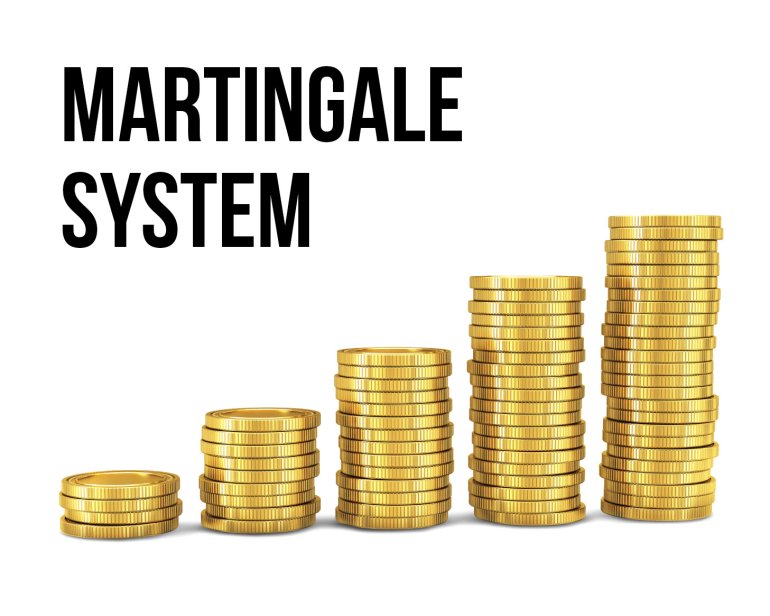
Most people have probably heard of the Martingale system or even tested it in some periods of their gambling life. Maybe they were unaware that they were using this system, but they were actually following it. Therefore, these players know this system is worthless, not only because they lose money using it.
What Is the Martingale System?
We will briefly explain this system for those who have not heard about it. According to the theory, if the event has only two outcomes, the law of large numbers comes into force. For example, if I throw a coin five times and five times it shows heads, there are very high chances of getting tails while tossing the coin next time, and the odds are only growing with each throw.
Of course, it is not true. Every coin toss is independent. However, this does not stop people from using the Martingale system for roulette, sports betting, blackjack, etc.
_770.jpg)
How does the Martingale system work in practice? You need to double your bet whenever you lose. Imagine for a second that the roulette wheel lacks the zero number, so it is only possible to stake on red and black. You wager $1 on red and lose. Next time, you bet $2 on red. If you lose again, you bet $4 on red. And in this way, you wager over and over again. Each loss leads to doubling the bet: $8 -> $16-> $32 -> $64 -> $128 -> $256 -> $512 and so on, until you eventually win, since it is inevitable according to the Martingale system.
Why Is Martingale a Bad System?
Two reasons explain the unprofitability of this system.
- You will still lose money in the long run. It's a mathematical fact. You do not have an infinite bankroll; even if you had, online and offline casinos have table betting limits, which can not be exceeded. Even if you have a lot of money, in any case, you can not make a bet since most casinos limit the maximum bet to $500-1,000 at the five-dollar tables.
- The second reason why the Martingale system is lame is the psychology. Think about it, is it not silly: when you have lost several times, you'll have to make a bet in the amount of $128 to win $1. Only $1! And if you will lose again? Will you risk $256 to win $1? Imagine if I approach you outdoors and offer you a bet: "If I flip a coin and it lands on heads, I owe you $1. If it lands on tails, you owe me $256." Would you agree? But fans of the Martingale system do not consider it silly!
If you have a limit of $500 to play roulette, you can lose it in just ten spins! And after 13 losses in a row, which frequently happens in roulette, you have to wager $8,192 to win $1. It is absolute nonsense, even if you have suddenly succeeded in finding a casino with such limits.
Yet, there is another important reason to avoid the Martingale system:
It is just boring.
When I'm going to play at any online or brick-and-mortar casino, I know that I have negative expectations in each game. It does not matter whether I play by the perfect strategy possible; I know I will lose in the long run. Negative expectations are a way for casinos to earn money. So when I play at casinos, I will have fun and entertain myself for my money. And it is pretty controversial entertainment to risk $512 to win $1.
You can check the Martingale system online by playing these free roulette games.
| Name | Soft | Return to player | |||
|
|
98.6% |
Play
T&C applies, 18+
|
|||
|
|
97.3% |
Play
T&C applies, 18+
|
|||
|
|
97.3% |
Play
T&C applies, 18+
|
|||
|
|
97.3% |
Play
T&C applies, 18+
|
|||
|
|
97.3% |
Play
T&C applies, 18+
|
|||
|
|
97.3% |
Play
T&C applies, 18+
|
|||
|
|
97.3% |
Play
T&C applies, 18+
|
|||
|
|
97.3% | ||||
|
|
97.3% |
Play
T&C applies, 18+
|
|||
|
|
97% |
Play
T&C applies, 18+
|
Why Are Martingale-Based Scams So Popular?
The Internet is full of websites that offer "safe systems for gamblers." The essence of this scam is always the same:
A "successful gambler" offers to buy the recent revolutionary super-duper betting system for casino games that has helped him earn hundreds or even thousands of dollars daily. There are different variants: it can be a clandestine syndicate of gamblers instead of the successful player; he can offer it for free instead of purchasing it, but below the text, the e-wallet address is provided, and there is a request to transfer any amount to it in case of the success; it is possible to play only at "verified and reliable" casinos, etc.

On closer examination, it turns out that the latest super-duper system is the same old Martingale, and earnings of this generous master of games include referral payments from casinos provided for advertising. The promotion is made professionally. It catches the eye. There are a lot of fake reviews from the "grateful customers" below, so many newcomers believe it. And the worst thing is that some of them can even win at the beginning, sharing this information with their friends and relatives purely from noble motives to allow them to earn. This results in losing your entire bankroll. But why are winnings possible at the beginning of the game? Let's discuss it.
We already know how the Martingale system operates, so let's calculate how this betting system will increase or decrease our chances of winning. The answer depends on many factors:
- types of games we play;
- the amount of the initial bet;
- the bankroll size, etc..
Let's take the following conditions as an example: we play European roulette with one zero, stake $5 on red, make 30 spins per hour, and have the $1,000 bankroll. So, if we wager $5 using flat bets every time, we will win only 46% of cases and lose 54%. If we finish the one-hour game in the black, we will win an average of $16. If the outcome is negative, the average loss will be $28.
Let's use the same initial conditions: roulette, $5 on red, 30 spins, and a $1,000 bankroll, but we will use the Martingale method and double our bet after each loss. Suddenly, our chances of winning the game in one hour increased to 82%! But if we win based on the results of one hour, our average profit will be only $68. And if we lose our one-hour game, our average loss will be $456. Bingo!

Keep in mind that the Martingale method is better in the short run. The longer you play, the higher the probability that you will lose. After all, the longer you play, the more likely you will meet a long series of losses, and you will either run out of money or will not be able to make the necessary bet according to the Martingale strategy due to table limits.
Another reason why scammers like to use Martingale is, of course, the system's simplicity. You should know that these scams have been designed specially for novice users. A person with even an insignificant experience at casinos will not believe them. But the newcomer can follow them easily. Therefore, simplicity is essential. Indeed, what is so tricky is double in case of a loss; if you have lost again, double again until the bitter end. And it is valid, but virtually, in a spherical vacuum :) Of course, no one will tell buyers of the "magic system" about the short and long run, prolonged series of losses, table limits... It is not necessary to lie; scammers can just hold back.
Marginal Notes
As a marginal note, I like establishing the rules when playing at a casino. For example, if I play the slots, I immediately withdraw money from the slot as soon as I have the double sum. Everything is simple; the goal should be present. Then, I can take a break, walk through the casino, and play something else: video poker, other gambling machines, or roulette, for example. This way of playing is amusing, and sometimes you can win something. You can visit the casino with $500 in your pocket and lose everything. Playing one slot and doubling the bet after a loss is dull and stupid.

Regarding games like blackjack or roulette, I also use the betting system, but not the Martingale method! Usually, I prefer using progressive betting systems and having much more fun than Martingale or systemless games, even if the outcome will be the same: the bankroll loss.
I prefer progressive betting systems in which increasing bets after the win is necessary but not after a loss. For example, the initial bet in blackjack is $10. In case of a loss, I wager $10 again. When I win the first time, I still stake $10. When two bets win in a row, the bet is increased to $15. If this bet also wins, I make a bet of $20, raising a bet by $5 after each victory until getting seven wins in a row or a loss. After that, I return to the standard bet of $10.
I prefer this type of system to flat bets because it's more interesting and profitable, perhaps... Let's calculate. Let's discuss a series of seven winning hands. If you make a flat bet of $10 each time, the payout is 7x $10 = $70. According to my system, the prize will be $10 + $10 + $15 + $20 + $25 + $30 + $35 = $145, i.e. two times higher! And the pleasure will be keener :)
You can check this betting system in the following games.
| Name | Soft | Return to player | |||
|
|
98.6% |
Play
T&C applies, 18+
|
|||
|
|
97.3% |
Play
T&C applies, 18+
|
|||
|
|
97.3% |
Play
T&C applies, 18+
|
|||
|
|
97.3% |
Play
T&C applies, 18+
|
|||
|
|
97.3% |
Play
T&C applies, 18+
|
|||
|
|
97.3% |
Play
T&C applies, 18+
|
|||
|
|
97.3% |
Play
T&C applies, 18+
|
|||
|
|
97.3% | ||||
|
|
97.3% |
Play
T&C applies, 18+
|
|||
|
|
97% |
Play
T&C applies, 18+
|
What Betting Systems for Gambling Games Exist?
Of course, it's not a perfect system, and I don't offer to play using it. There are many other systems, for example, the D'Alembert betting system, in which you increase your bet by a certain amount after each loss and decrease it after each win. For example, you have both the initial bet and the increment of $10. You bet $10 and lose. It means that the next bet should be $20. If you lose again, you should wager $30. If you win the next time, you have to stake $20. And so on. This system is without spikes, but it is much more interesting to play than flat bets.
Moreover, this system provides only the principle, not the bet sizes. You can increase or decrease the bet by $10 but also by $5 or $20, as you wish. You can turn everything upside down and play using the anti-D'Alembert betting system, i.e., increase the bet after a win and decrease it after a loss. It is up to you to decide! You should just enjoy the gameplay.
There are also limited cyclic betting systems, such as the 1-2-3-5-1 system. Here, you will start playing with the basic bet of $10. It does not matter whether you win or lose, but the next bet should equal $20. The third bet is $30, and the fourth is $50. The cycle can be repeated again, starting from $10.

There are many exciting systems: the Oscar's Grind system, the Guetting progression, Whitaker, etc. Their descriptions can be found on the Internet. However, you should remember that none of these systems will bring you a guaranteed win. Never! In any case, you will lose money in the long run. But when you visit a casino, you won't play a million hands in a row! Any system of bets increases your chances of finishing the game in the black in the short run. You should also consider that you have much more fun using the progressive betting system than games with flat bets or Martingale.
Finally, the game using any system will protect you from the impetuous bets. I have often observed people who lost from eight to ten flat bets of $10 playing blackjack, and then he had an idea to stake $100 to win back everything at once. The logic of such actions is simple: "I have already lost ten times in a row; now I should win!" Unfortunately, according to Murphy's law, this bet is also lost in most cases...
Should You Use Betting Systems While Gambling?
First, pick reliable online casinos if you play for real money. Here are some trustworthy websites.
So, using betting systems at casinos, you will get much more pleasure from the gameplay and can control your bets better. But never play using the Martingale method!












































